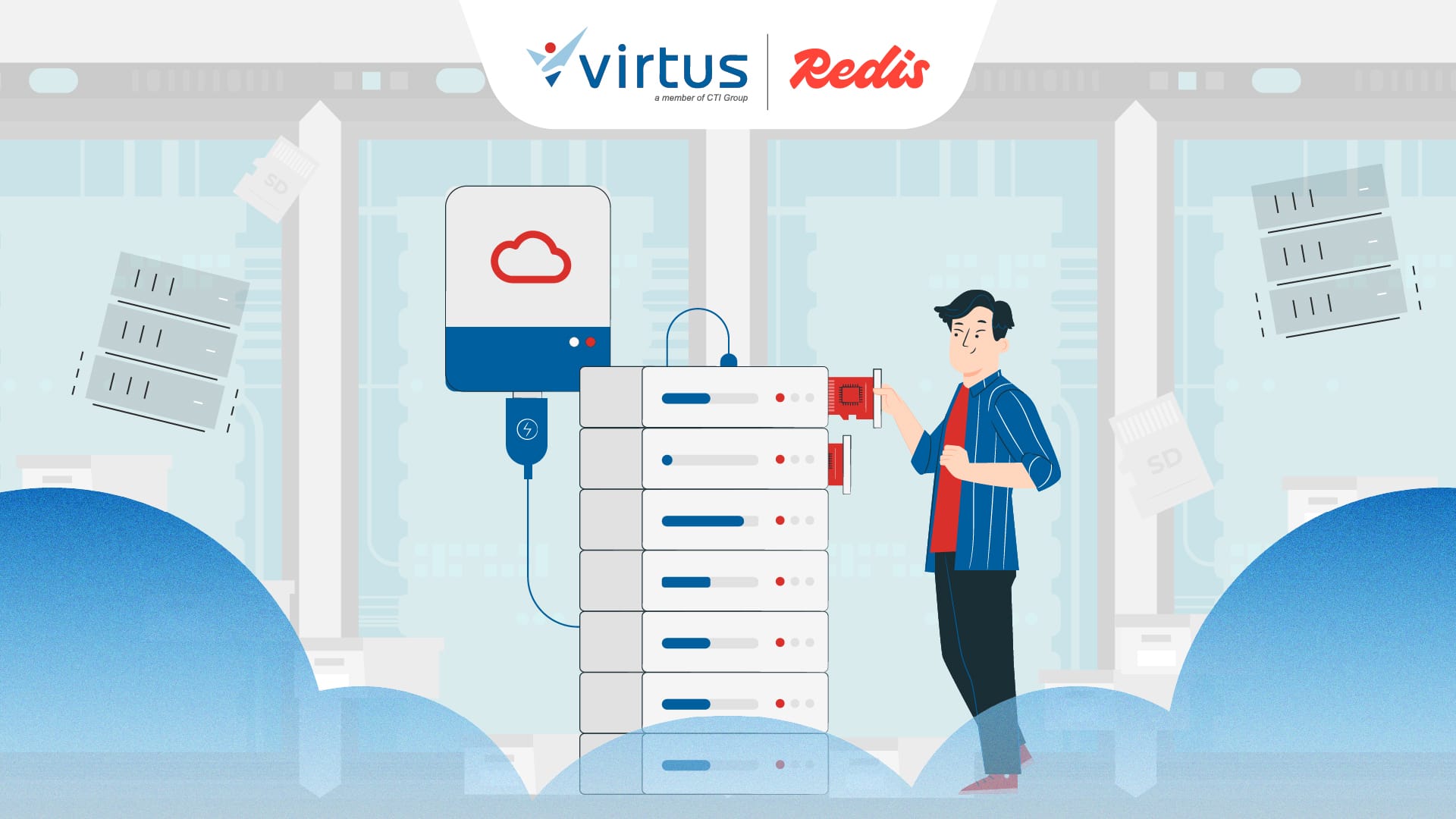In-memory storage has become a revolutionary solution in modern data processing, with the ability to store data directly in RAM, delivering significantly faster access speeds compared to hard disks. This is why in-memory storage is used to support applications requiring real-time performance, such as Big Data analytics, financial transaction management, and gaming leaderboards.
As a fast, flexible, and reliable solution, in-memory storage also supports various application needs with high scalability capabilities. With the rapid growth of data and increasing demands of modern applications, in-memory storage has become a vital technology to ensure efficiency and seamless operations across industries. This article will explore how in-memory storage can help boost the performance of your applications.
What is In-memory Storage?
In-memory storage is a data storage solution designed for speed and efficiency. Unlike traditional methods that rely on disks or hard drives, this technology stores data directly in the main memory (RAM). As a result, data read and write processes become significantly faster, delivering optimal performance for applications requiring quick responses such as real-time analytics, transaction processing, or AI-powered services.
As data processing needs become increasingly complex, implementing in-memory storage has become essential for businesses as it can handle heavy workloads without sacrificing performance. This article will delve into the functions, workings, as well as the various advantages and disadvantages of in-memory storage, which is transforming the landscape of modern data processing.
Functions of In-memory Storage
Based on various sources, the primary function of in-memory storage is to support applications that require low response times, high throughput, and real-time data processing. In-memory storage is often utilized in the following scenarios:
- Caching to store frequently accessed data.
- Real-time analytics for processing data instantly without latency.
- Temporary storage, such as session management for applications.
In-memory storage can enhance query performance by reducing dependency on disks (I/O reduction) and enabling applications to handle large workloads while maintaining high performance. This solution helps businesses make data-driven decisions in milliseconds, detect fraud, and optimize analytics.
Differences Between In-memory Storage and Hard-Disk
In-memory storage is often mistakenly equated with hard disks. However, the two are entirely different storage solutions.
While in-memory storage focuses on data access speed with low latency, hard disks provide large storage capacity at a lower cost for permanent storage. Here is a detailed comparison between hard disks and in-memory storage:
| Differences | In-memory Storage | Hard-disk |
| Storage location | Data is stored directly in RAM, designed for high-speed data access. | Data is stored in physical disks such as HDD or SSD, designed for permanent data storage. |
| Access speed | Response times are fast because data is accessed from RAM without needing to be read from disk. Ideal for applications that require low latency and high throughput. | Data access is relatively slower due to the read/write mechanism and seek time, especially for HDD. SSDs are faster but still slower compared to RAM. Suitable for storing large data volumes that do not require instant access. |
| Scalability and capacity | RAM capacity is limited compared to hard disks and can be expensive for storing large amounts of data. | Storage capacity is much larger with lower cost per gigabit, making it ideal for long-term storage. |
| Uses | Used for applications that require fast data processing, such as caching, real-time analytics, and temporary data storage for frequently performed operations. | Used for long-term storage, such as primary databases, backups, data archives, and large file storage. |
| Infrastructure management | Requires integrated infrastructure management, such as backup strategies or migration to disk in case of system failure. | Easier to configure for permanent storage without needing special actions to ensure data persistence. |
How In-memory Storage Works?

In-memory storage works by utilizing RAM to store and manage data directly, enabling fast access and low latency. With its volatile nature and focus on high performance, this technology is ideal for use cases such as caching, real-time analytics, and applications requiring low-latency responses. Here is a detailed explanation of how in-memory storage works:
- Data is stored and accessed directly through RAM, which offers significantly faster access times and high-speed data read/write processes compared to disks.
- It ensures faster data access, resulting in low latency, making it ideal for applications that require real-time response times.
- In the event of power failures or system shutdowns, the stored data is lost due to the volatile nature of in-memory storage. This is why it is often used for temporary storage (caching) rather than permanent data storage.
- It is designed to handle workloads requiring high performance efficiently.
- In some cases, in-memory storage can be combined with disk-based storage (hybrid). Frequently accessed data is stored in in-memory storage for quick access, while less frequently used data is stored on disks as secondary storage.
Advantages and Disadvantages of In-memory Databases
In-memory storage excels in speed and supports modern applications that require fast response times and real-time analytics. While it offers numerous advantages, there are also certain drawbacks to consider during implementation. Below are its advantages and disadvantages.
Advantages of In-memory Database
- High Speed: Data is stored in RAM, enabling extremely fast data access.
- Low Latency and High Throughput: Ideal for applications with heavy workloads, such as financial transactions or recommendation systems.
- Real-time Data Processing: Supports instant data processing, real-time analytics, user personalization, and fraud detection.
- Easy Data Management: Reduces the need for manual infrastructure maintenance, including replication, scalability, and cluster management.
- Versatility Across Various Scenarios: Useful for caching frequently accessed data, managing application sessions, and interconnecting applications within complex systems.
Disadvantages of In-memory Database
While in-memory databases provide many benefits, they also come with certain limitations:
- Data Volatility: Data is lost when the device is powered off or the system fails. Critical data should be replicated to persistent storage.
- High Costs: RAM-based storage is more expensive than disk-based storage, making it challenging for large datasets or budget-constrained applications.
- Limited Capacity: Not suitable for storing massive amounts of data.
- Hybrid Storage Complexity: Often requires integration with disk-based storage to ensure data persistence, adding complexity to the system.
- Infrastructure Requirements: Optimal performance demands high-performance infrastructure, such as large-capacity RAM and high-speed networks, which can increase operational costs.
Read More: The Future of Education: Transformation with Smart Education Systems
Use Cases for In-memory Databases
In-memory databases can be implemented across various scenarios. Here are some notable examples:
Caching
Caching is used to improve application performance and user experience by providing quick data access. It minimizes latency, boosts application performance, and reduces costs by enabling more efficient resource access. Here are three examples of caching use cases:
- E-commerce: Storing product data, search results, or user information in memory to accelerate page load times.
- Web Applications: Frequently accessed static data, such as page templates, app configurations, or metadata, is cached to reduce the load on the primary server.
- Fast API Responses: For applications requiring low response times, caching can store database query results or API data, reducing latency.
Real-time Bidding
In-memory databases play a crucial role in real-time bidding (RTB). In RTB, servers must process millions of requests within milliseconds to allow advertisers to dynamically bid in digital ad auctions. Here are three key roles of in-memory databases in RTB:
- Execution Speed: RTB demands low-latency data retrieval, computation, and decision-making, ensuring faster bidding processes.
- Personalized Ads: In-memory databases store user profile data, such as preferences, browsing history, or behavior, for instant access during ad bids.
- Scalability: Handles large RTB request volumes without compromising performance.
Gaming Leaderboards
In-memory databases are well-suited for managing leaderboards in gaming applications, which require real-time data processing to display player rankings based on scores or other metrics. They can be used for local or global gaming competitions. Here are four roles of in-memory databases in this context:
- Real-time Updates: Player scores are updated instantly, ensuring the leaderboard reflects real-time standings without delays.
- High Read/Write Throughput: Handles rapid read and write requests from thousands or millions of players without degrading application performance.
- Fast Sorting and Filtering: Quickly sorts and filters data to generate accurate and dynamic leaderboards.
- Enhanced User Engagement: Displays leaderboards quickly and responsively, keeping players engaged by showing real-time results.
Redis: Practical In-memory Storage for Your Business
Redis is a practical and reliable in-memory storage solution, designed to provide extremely fast data access, high flexibility, and reliable scalability. Redis is known as an open-source RAM-based database, making it ideal for the needs of modern applications that require real-time performance and fast data processing.
The main advantage of Redis lies in its ability to deliver real-time performance with sub-millisecond latency, even when handling millions of operations per second. This helps improve application performance by eliminating request queues, slow loading times, and the risk of application crashes.
Redis also stands out for its flexibility, as it supports a wide range of data types, including strings, lists, sets, sorted sets, hashes, streams, bitmaps, and HyperLogLog. With this support for diverse data structures, Redis allows developers to store and process data in various formats according to application requirements.
This solution also offers high scalability through features such as clustering, active-active replication, and geo-replication, allowing it to easily handle increasing workloads or data volumes. Redis ensures consistent data availability even in high-demand environments. In terms of security, Redis provides strict access controls, data encryption, and LDAP integration, making it suitable for applications that require high security, such as those in the finance or healthcare sectors.
Why Choose Redis?

Redis is the ideal in-memory storage solution for modern applications that require high speed, flexibility, and scalability. With real-time performance, support for a variety of data structures, advanced security, and a large community, Redis is the top choice for various use cases, including caching, real-time analytics, session management, and AI/ML-based applications.
Redis supports vector storage features, which are particularly useful for AI and ML-based applications, such as product recommendations or data analysis. Additionally, Redis comes equipped with monitoring tools like RedisInsight and integration with Grafana, enabling visual and efficient management of database performance and health.
With a large developer community, Redis also provides extensive technical support, documentation, and resources that make it easier for users to integrate Redis into their systems. With a combination of speed, flexibility, scalability, and ease of use, Redis is an excellent choice for applications that require fast and reliable in-memory storage.
Get Redis Solution Only at Virtus
Virtus Technology Indonesia (VTI) as the world’s first Redis distributor, is ready to help you bring in-memory storage solutions with fast data access, high flexibility, and reliable scalability to meet your company’s needs. Supported by a competent and certified IT team, Virtus, a subsidiary of CTI Group will guide you through the entire Redis in-memory storage implementation process, from consultation and deployment to management and after-sales support.
Interested? Click the link below to get a FREE consultation, free trial, and a demo of this solution with Virtus.
Author: Ervina Anggraini – Content Writer CTI Group



























